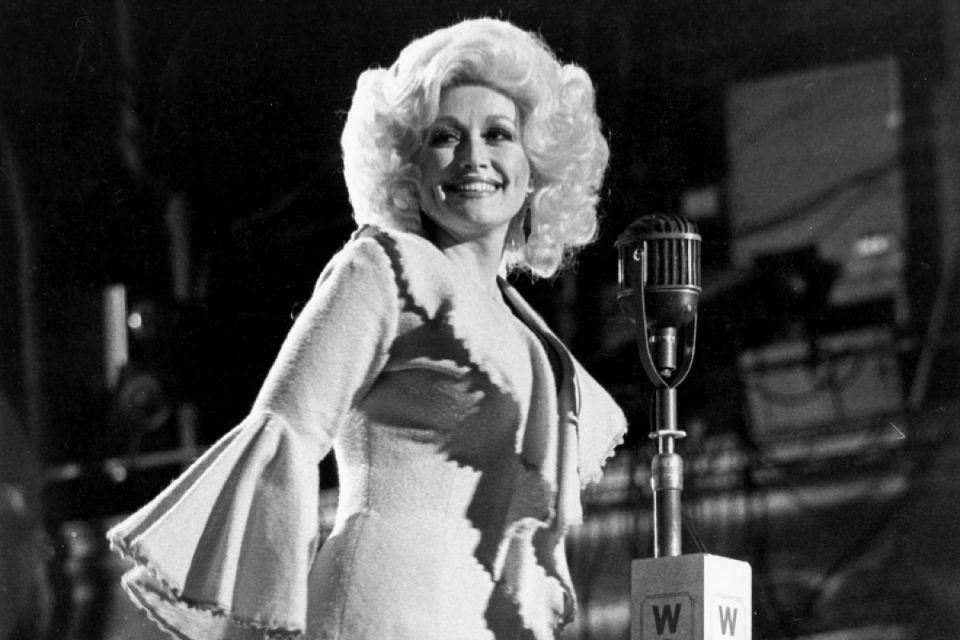What a New Dolly Parton Podcast Has to Say About Life in the United States
The nine-part ‘Dolly Parton’s America,’ created by WNYC Studios and ‘Radiolab’ co-host Jad Abumrad, launched Tuesday, October 15th

Dolly Parton is the subject of a new podcast from WNYC Studios and Jad Abumrad. Photo: Barr/Mediapunch/Shutterstock
On Tuesday, WNYC Studios and Radiolab‘s Jad Abumrad launched the first episode of Dolly Parton’s America, a new podcast examining the life, art, and cultural influence of one of country music’s most beloved figures. Beginning with a look into the East Tennessee native’s music, or “Sad Ass Songs,” as this episode is titled, the nine-part weekly series delves into what the “Jolene” singer’s life says about America.
Abumrad, who was raised in Nashville, grew up with an awareness of Parton but listened to what he calls “an amalgam of opera, bad hair metal, and Lebanese music” when he was younger. He got the idea for the podcast after recognizing the many different types of people brought together in appreciation of Parton, whether through music, her film work like 9 to 5 and Steel Magnolias, or just her larger-than-life personality. Against the backdrop of the rancorous 2016 election and beyond, that felt like a unique ability.
“I started noticing this person I grew up with was being looked at by a whole different group of people in a new way,” says Abumrad. “Particularly at this moment in America when we don’t have too many unifying figures, everybody loves Dolly.”
Over the course of two years, Abumrad began interviewing Parton and others in her sphere, including Ralph Emery, Rhiannon Giddens, Jane Fonda, and Gloria Steinem. He also chatted with students at the University of Tennessee in Knoxville who were studying Parton and history.
“Dolly is a multi-verse. She’s this portal to so many different kinds of stories,” says Abumrad. “Some of it is music-related. Some of it is biographical to her. Some of it is the story of the South. Some of it is about country music and the development of the country music industry.”
Parton, who recently celebrated her 50th anniversary as a Grand Ole Opry member, is impressed by the commitment that Abumrad and his team put into Dolly Parton’s America.
“I’ve been so lucky to see so many dreams come true, so it’s nice to be able to present that in such a way, especially when people do such a good job of really doing their research and really making it interesting for you rather than just your basic questions,” she tells Rolling Stone. “They go really in-depth and drag up all sorts of things and talk to all sorts of people.”
In the first episode, Abumrad also looks at a point in time that predates the colorful, wisecracking character that most people associate with Parton. A Sixties-era interview shows the singer to have a far more serious disposition, but her songwriting already has a feminist streak and she’s telling some of the familiar parts of her biography. She hasn’t transformed into all-caps DOLLY yet, but it suggests there may not be much distance between the person and persona, though Parton’s thorough mastery over her own narrative may make that unknowable.
“She tells the same stories, with a totally different affect. Very different person there. The swagger is not there,” says Abumrad of the archival interview. “So that was really interesting. Part of me thinks, I don’t know if there’s a huge difference between the inside and the outside.”
Also featured in the series is Abumrad’s father Naji, a Nashville surgeon who formed a friendship with Parton when he consulted on her medical team in the wake of a 2014 car accident. Through working on this project, the younger Abumrad began to see some parallels between the two, despite the fact his father, a Lebanese immigrant, began his life on a different continent than Parton. It changed the way Abumrad saw Parton and the far-reaching potential of her work.
“I began to think about Dolly’s music as migration music — music for displaced peoples,” says Abumrad. “People who’ve left their homes and come down the mountain to try and conquer the world, which is so many stories. It’s the music of movement and longing for the place you left.
“Everybody has their blind spots, but there’s something in her stance that feels very welcoming,” he adds. “I was moved to discover that her music could also speak to me and my dad and our background. I just didn’t see that coming. It made me think differently about my childhood.”
Additional reporting by Brittany Spanos







